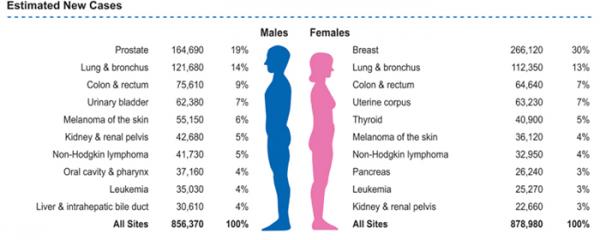Cancer death rate has dropped, but liver cancer incidence continues to increase rapidly in women and stabilizing in men

The overall cancer death rate in the USA declined by 1.7 percent in 2015, this is the latest indication of steady, long-term progress against the disease, according to a new report by the American Cancer Society. However, look into the report in more detail we can see a continued increase of liver cancer cases, especially in women.
Over nearly a quarter-century, the mortality rate has fallen 26 percent, resulting in almost 2.4 million fewer deaths than if peak rates had continued. But not for liver cancer, the number of liver cancer death has increased with the latest estimated deaths of liver cancer is 30,200 in 2018.
“Liver cancer incidence continues to increase rapidly in women, but appears to be plateauing in men since 2010. However, trends vary by age; from 2010 to 2014, rates increased annually by 1% to 2% in men and women aged younger than 40 years, decreased or were stable in men and women aged 40 to 59 years, and increased annually by 8% in individuals aged 60 to 69 years and by 3% in those aged 70 years and older.”
Difficulties in liver cancer treatment
When treating liver cancer it is often difficult as there are little symptoms in the early stages of the disease, and the tumor is often developed into a more advanced stages leading to difficulties in treatment, leading to a high percentage of death cases, also because our liver is used to process toxins and made new blood, it can quickly spread it to other parts of our body.
From the latest report’s there is a prediction of more than 67% death rates for men, and even higher for women.
Prevention and minimise risks
As liver cancer is hard to spot without testings and scans, people who are at high risks of liver cancer are recommended to have regular liver check-ups, these include people with High ALT level, chronic liver disease, people with liver fibrosis, cirrhosis, or other viral hepatitis, people who are cured of hepatitis C are also still in risks of liver as research shows that people can develop liver cancer after successful DAAs treatments. According to the liver foundations, high risks patients should monitor their liver health every 6 to 12 months.
Protective therapy against abnormal liver cells growth
YHK therapy is a scientifically based natural liver support; research shows that YHK can efficiently help to prevent the growth of abnormal liver cells and to maintain healthy, normal liver function. This effect is especially useful for people who are at high risks to use as a preventive measure.
Research of YHK on the subject (published by Annals of Hepatology), wrote:
“These data suggest that YHK seem to modulate the extrinsic and intrinsic regulators of apoptosis and sensitize tumour cells to apoptosis. These preliminary data are worth interest when considering that this nutraceutical has been shown in vitro and in vivo to exert protective anti-tumour effect by redox status- modulating and immunoregulatory actions.
Given its lack of toxicity so far reported, such natural product might represent an effective nutritional supplement in some pathological conditions where a chemopreventive strategy is planned.”
- * All research and clinical data should be used as reference purposes only, results may vary.






